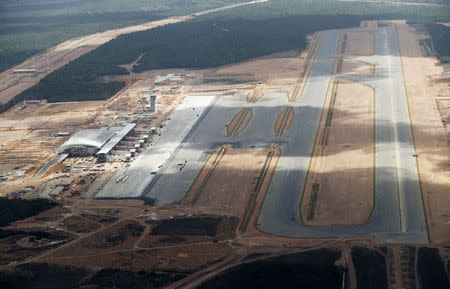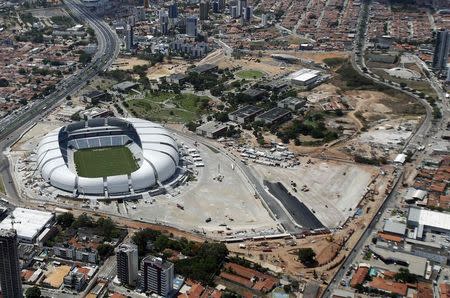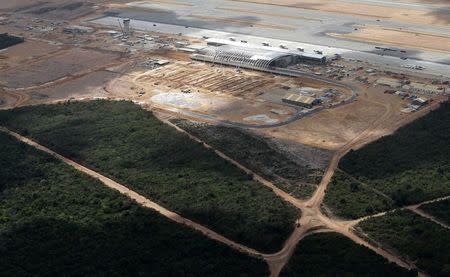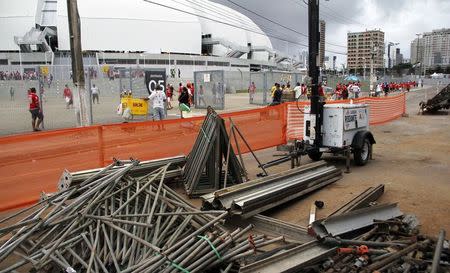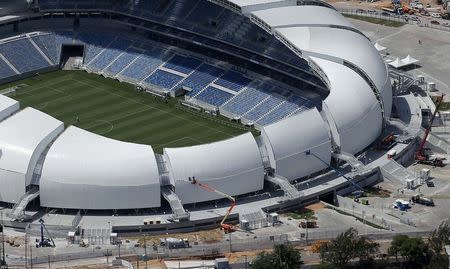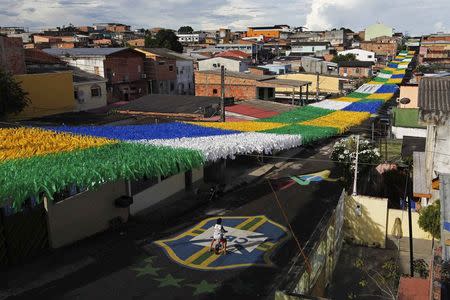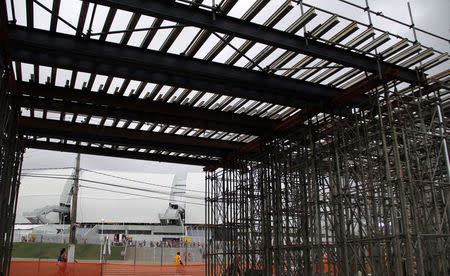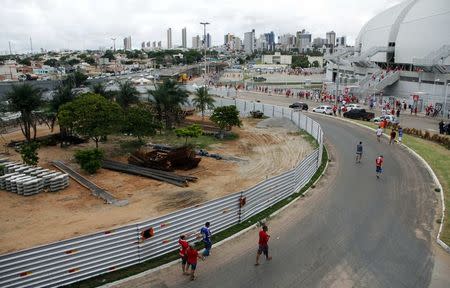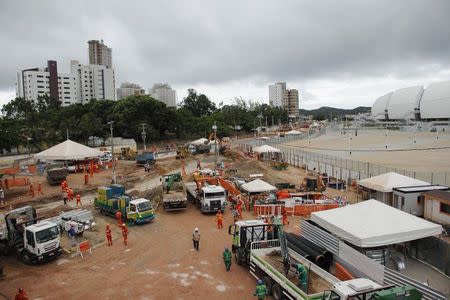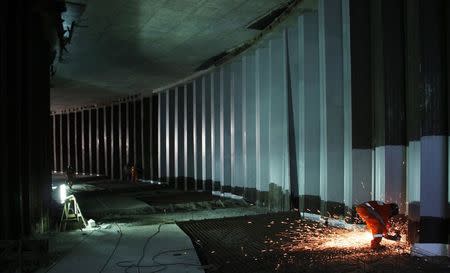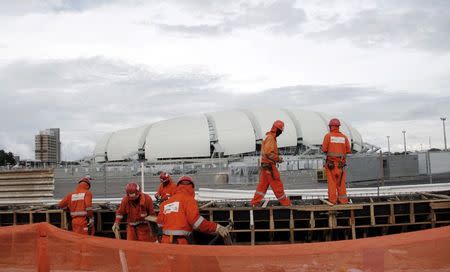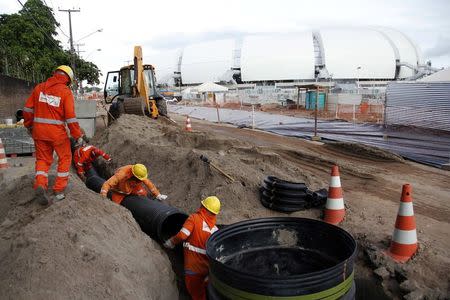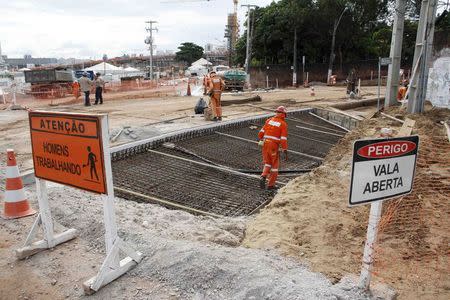Brazilians left wanting by flawed World Cup investments
By Paulo Prada NATAL Brazil (Reuters) - When Brazil drafted plans to host the upcoming World Cup, this Atlantic beach destination was exactly the type of city it wanted to show off. A nationwide economic boom was transforming the once-sleepy backwater into a fast-growing city typical of the new Brazil, a country at last poised to make its long-promised leap into the first world. Who cares that Natal, in the historically poor northeast, lies far from the nerve centers of Rio de Janeiro and São Paulo? Or that its stadium, home to middling regional teams, was hardly a venue for big-league soccer, let alone the world's most popular tournament? Natal would build a state-of-the-art new arena, authorities said, and all manner of additional infrastructure, too. They promised a light rail network, a new hospital, a beachfront facelift and wheelchair-friendly sidewalks. Five years later, and four weeks before kickoff, little besides the arena and a remote, untested airport are complete. Almost half the more than $1.3 billion in promised developments never began. What did has languished, including ongoing road work that has rendered the stadium's outskirts a raw sprawl of rebar, dust and concrete. "This is a missed opportunity," says Fernando Mineiro, a state assemblyman for the leftist Workers' Party, now in its 12th year in national power. "Natal failed to deliver." Cities go after the World Cup, the Olympics and other events because the tourism, broadcast exposure and other revenues can justify infrastructure investments and other "legacy" benefits like those that famously remade Barcelona for the 1992 Olympics. But waste is also common, often leaving idle infrastructure, like useless South African stadiums after the 2010 Cup, as legacies of little but vanity. Across Brazil, especially its 12 Cup venues, locals are lamenting high costs, delays and stillborn investments. Bureaucracy, corruption and political squabbling, they say, has led to the usual lack of follow-through that has often hobbled development in Latin America's biggest country. A $16 billion bullet train between Rio and São Paulo never got off the drawing board. Instead of a new airport terminal, passengers in Fortaleza will pass through a huge tent. A $700 million rail line in the farm-belt capital of Cuiabá won't be ready until well after the Cup. Nationwide, only 36 of 93 major projects are complete, according to Sinaenco, a trade group of engineers and architects. The shortfalls compound already widespread discontent over the roughly $11 billion spent on the event. The cost is particularly vexing now that Brazil's economy, after a near-decade of average annual growth over four percent, has lumbered to half that rate. Mass protests erupted across Brazil last June during a tournament considered a World Cup warm-up, and smaller demonstrations have continued. The Cup, many Brazilians say, reveals still-glaring divides in a country big on spectacle but weak on health care, infrastructure, education and other vital services. "It will be a beautiful tournament," says Maria Santos, a 29-year-old Natal nurse in line for a bus to a hospital where she and colleagues often work without latex gloves and syringes. "But whatever they spend on it would be better spent elsewhere." Like other host cities where ambition outpaced reality, and Brazil's economy itself, Natal fell far short of developed-world aspirations. The city of just under 1 million residents is beset by soaring crime, crippling traffic, erratic public finances and local politics so baroque, and allegedly corrupt, that a mayor was recently ousted and the current state governor faces possible impeachment. "Things haven't gone quite as predicted," says José Aldemir Freire, an economist at the local office of Brazil's national statistics agency. "There were some investments, yes, but not on the scale expected." FIFA, soccer's global authority, at first expected only eight host cities. But Brazil's government and national soccer kingpins wanted to show off more, scoring regional political points in the process. Brazil, they told FIFA, would prepare 12 venues, unleashing a scramble among second-tier cities. "We were an ugly duckling," recalls Fernando Fernandes, a former state secretary for the event. But Natal had advantages. At the elbow of South America, it is closer to Europe than any other destination in Brazil. Natal's shoreline, along towering dunes that shape its landscape, boasts more hotel rooms than any host besides Rio, São Paulo and Salvador. When FIFA announced Natal's name at a ceremony in May 2009, residents gathered beachside to watch live on a giant screen. Fireworks flared overhead and local officials promptly began making promises. STALLED PROJECTS, MESSY POLITICS Their first challenge was the new stadium. FIFA required an arena for at least 42,000 spectators – ten times the average for routine Natal games. Local officials decided to demolish the existing stadium and build anew. They hired architects and calculated a cost of $180 million for the new arena. When they sought bids for the job in 2010, though, contractors said it couldn't be built for that price. Organizers scaled back the blueprint, reducing the size of a wavy canopy around the top that is a nod to the nearby dunes. They settled for 32,000 permanent seats, the additional 10,000 for the Cup installed only temporarily. In February 2011, OAS SA, a São Paulo builder, took the job. The federal government, meanwhile, agreed to finance an airport. Though an existing airport easily accommodates Natal's passenger traffic, local industry wanted another facility to boost cargo capacity. The federal government would invest roughly $260 million but would rely on a contractor to build it and the state of Rio Grande do Norte, of which Natal is capital, to lay access roads. The city, for its part, agreed to improve traffic and drainage near the stadium. But the promise of six new tunnels and two new viaducts stalled. Locals pressed then-mayor Micarla de Sousa for results. "She did absolutely nothing," says Carlos Eduardo Alves, Natal's current mayor. De Sousa said she struggled to secure financing. She also suffered health problems that led her by early 2012 to announce she wouldn't seek re-election. In October 2012, two months before her term's end, a state court ousted her, alleging irregularities in city contracts. De Sousa, in an interview, denied wrongdoing. She says her removal was orchestrated by opponents and notes she has yet to be charged with a crime. Regardless, Natal by 2013 had little city work underway. Alves, the incumbent, says he revamped the plans and finally began $290 billion worth of construction early this year. He says most of the ongoing work will be completed, or cleaned up, by showtime. Stadium neighbors, weary of the jackhammers, are skeptical. "Good thing people can't drive to the games," scoffs Rodrigo Pereira, a shopkeeper near one of the tunnels, citing FIFA rules for a large security perimeter around matches, forcing attendees to walk. "My customers can't even reach me." The state, too, is under fire. The stadium contract, a partnership with the builder, obliges the state to reimburse construction loans and pay management fees. Over two decades, it is expected to pay over $900 million, approximately five times the job cost. While most locals say they like the stadium, with its undulating roof, they worry about the bill. "We have real concerns about the ultimate price," says Luciano Ramos, an auditor with a state court reviewing the contract. The state is also criticized because it is only now finishing the first of two airport roads. The airport itself may not be operational by game time – a tentative launch is scheduled May 22. Governor Rosalba Ciarlini blames bureaucracy and high personnel costs, an "inheritance" from previous administrations that she says limit the state's ability to invest. Payroll is so bloated the state pays salaries late. Some contractors, including suppliers to hospitals, have quit transacting with the state. Controversial herself, Ciarlini faces impeachment efforts because a state court earlier this year found she favored political allies with pork-barrel spending. Ciarlini calls the ruling politically motivated. The stadium's cost, she says, will be offset by revenues from future events, even though critics say Natal has neither the soccer heft nor the pull on the concert circuit to guarantee profitability. The price of the partnership, she says, is the cost of long-term financing. "This is like buying a car. You don't pay the sticker price." Besides, "we have the prettiest new arena in Brazil." (Editing by Todd Benson and Kieran Murray)
